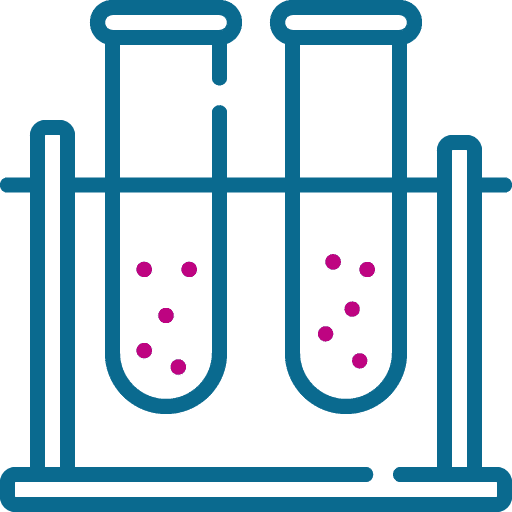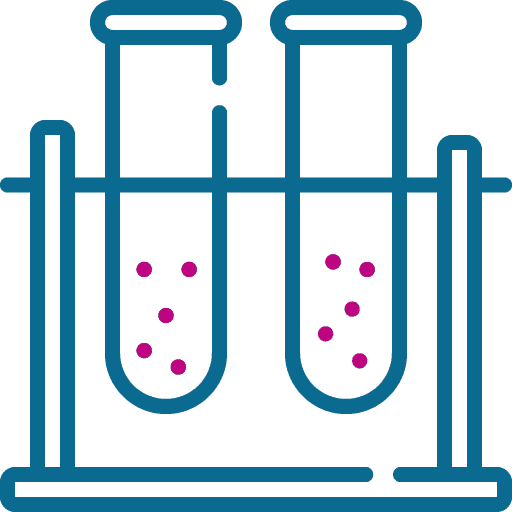Biochemical tests
| Image | Kraujo tyrimas | Kraujo tyrimo aprašymas | Kaina | Pirkti | Details | hf:tax:product_tag |
|---|---|---|---|---|---|---|
| Alanine aminotransferase (ALAT, GPT) | It is often ordered together with an aspartate aminotransferase (AST) test for the diagnosis or evaluation of liver disease. AST and ALT are considered the two most important tests for detecting liver damage. | 5,00 € | Show details | biochemical-tests | ||
| Alanine aminotransferase (ALAT, GPT) | When your doctor suspects liver damage. Patients with general weakness, fatigue, loss of appetite, nausea and/or vomiting, ascites and/or abdominal pain, yellowing of the skin and mucous membranes (jaundice), darkening of the urine, altered stools, itchy skin. | 5,00 € | Show details | biochemical-tests | ||
| Albumin | The test is carried out in cases of suspected liver impairment, kidney disease, or in people with significant changes in body weight, as well as before elective surgery. | 5,00 € | Show details | biochemical-tests | ||
| Albumin | A screening test to assess liver dysfunction or kidney disease. It is also suitable for assessing nutritional status (especially in hospitalised patients). | 5,00 € | Show details | biochemical-tests | ||
| Alkaline phosphatase | It is an indicator of bone and liver pathology. Important to note: sometimes an increase in this enzyme can be due to the patient’s blood being tested after a meal. | 5,00 € | Show details | biochemical-tests | ||
| Alkaline phosphatase | It is an indicator of bone and liver pathology. Important to note: sometimes an increase in this enzyme can be due to the patient’s blood being tested after a meal. | 5,00 € | Show details | biochemical-tests | ||
| Antistreptolysin-O (ASO) | Streptococcus bacteria are the most common cause of sore throats, tooth abscesses and skin infections such as rosacea. It can also damage joints, heart and kidneys. | 15,00 € | Show details | biochemical-tests | ||
| Antistreptolysin-O (ASO) - quantitative test | The indicator is useful in detecting contact with streptococcal infection. | 15,00 € | Show details | biochemical-tests | ||
| Aspartate aminotransferase (ASAT, GOT) | Investigation of liver damage. It is often ordered together with an alanine aminotransferase (ALT) test for the diagnosis or evaluation of liver disease. AST and ALT are considered the two most important tests for detecting liver damage. | 5,00 € | Show details | biochemical-tests | ||
| Aspartate aminotransferase (ASAT, GOT) | Investigation of liver damage. It is often ordered together with an alanine aminotransferase (ALT) test for the diagnosis or evaluation of liver disease. AST and ALT are considered the two most important tests for detecting liver damage. | 5,00 € | Show details | biochemical-tests | ||
| C-reactive protein (CRB) | The C-reactive protein (CRB) test is used to detect inflammation when tissue damage or inflammation caused by infection is suspected. | 8,50 € | Show details | biochemical-tests | ||
| C-reactive protein (CRB) | The C-reactive protein (CRB) test is used to detect inflammation when tissue damage or inflammation caused by infection is suspected. | 8,50 € | Show details | biochemical-tests | ||
| Calcium ionised | It is recommended when changes in total calcium levels are detected. | 13,50 € | Show details | biochemical-tests | ||
| Chlorine | Determined by assessing electrolyte-liquid balance. | 7,00 € | Show details | biochemical-tests | ||
| Chlorine | Chlorine concentrations decrease with excessive fluid intake, prolonged vomiting, adrenal pathology, heart and kidney failure. | 7,00 € | Show details | biochemical-tests | ||
| Cholesterol | Cholesterol testing differs from many other tests in that it is not only used to detect disease, but also to assess the risk of disease – especially ischaemic heart disease. | 4,50 € | Show details | biochemical-tests | ||
| Cholesterol | For adults, it is recommended to have a cholesterol test every five years. | 4,50 € | Show details | biochemical-tests | ||
| Creatinine | The test is used to assess kidney function and to monitor the treatment of kidney disease. | 5,00 € | Show details | biochemical-tests | ||
| Creatinine | The test is used to assess kidney function and monitor the treatment of kidney disease. | 5,00 € | Show details | biochemical-tests | ||
| Ferritin | The test is designed to assess how much iron is stored in the body. | 14,00 € | Show details | biochemical-tests | ||
| Ferritin | Ferritin is an acute-phase protein, which means that its levels increase in people with inflammatory diseases, liver diseases, chronic infections, autoimmune diseases and certain cancers, and in people with alcohol abuse. | 14,00 € | Show details | biochemical-tests | ||
| Gammaglutamyltransferase (GGT) | One of the most sensitive indicators of cholestatic liver syndrome, alcoholic and toxic liver injury, and liver metastases, with an increase that can become apparent early in the disease. | 5,00 € | Show details | biochemical-tests | ||
| Gammaglutamyltransferase (GGT) | One of the most sensitive indicators of cholestatic liver syndrome, alcoholic and toxic liver injury, and liver metastases, with an increase that can become apparent early in the disease. | 5,00 € | Show details | biochemical-tests | ||
| Glucose | The test is needed to monitor people for diabetes mellitus, elevated glucose levels (hyperglycaemia) or reduced glucose levels (hypoglycaemia). | 4,00 € | Show details | biochemical-tests | ||
| Glucose | The test is needed to monitor people for diabetes mellitus, elevated glucose levels (hyperglycaemia) or reduced glucose levels (hypoglycaemia). | 4,00 € | Show details | biochemical-tests | ||
| HDL (α) cholesterol | HDL cholesterol testing is used to properly assess the risk of cardiovascular disease. | 5,00 € | Show details | biochemical-tests | ||
| HDL cholesterol | HDL cholesterol testing is used to properly assess the risk of cardiovascular disease. | 5,00 € | Show details | biochemical-tests | ||
| High sensitivity CRB | The high-sensitivity C-reactive protein (CRP) test is used to assess the risk of cardiovascular disease. | 12,50 € | Show details | biochemical-tests | ||
| Homocysteine | The test is used to assess nutritional status when deficiencies of folic acid, vitamin B6 and/or vitamin B12 are suspected. It is used to diagnose the rare birth defect homocystinuria. | 31,00 € | Show details | biochemical-tests | ||
| Lactate dehydrogenase (LDH) | The LDH test is primarily used as a general indicator of the fact and severity of acute or chronic tissue damage. It is also used to assess the course of certain chronic diseases such as cancer, kidney and liver disease. | 8,00 € | Show details | biochemical-tests | ||
| LDL (β) cholesterol | LDL cholesterol testing is used to properly assess the risk of cardiovascular disease. | 6,50 € | Show details | biochemical-tests | ||
| LDL (β) cholesterol | LDL cholesterol testing is used to properly assess the risk of cardiovascular disease. | 6,50 € | Show details | biochemical-tests | ||
| Magnesium | The test is used to determine the magnesium level in the blood, to assess the severity of kidney disease or uncontrolled diabetes, to diagnose gastrointestinal disorders, and to evaluate the causes of changes in calcium, potassium, phosphorus and parathyroid hormone (PTH). | 5,00 € | Show details | biochemical-tests | ||
| Magnesium | The test is used to determine the magnesium level in the blood, to assess the severity of kidney disease or uncontrolled diabetes, to diagnose gastrointestinal disorders, and to evaluate the causes of changes in calcium, potassium, phosphorus and parathyroid hormone (PTH). | 5,00 € | Show details | biochemical-tests | ||
| Natris | Sodium levels should be monitored for kidney disease, acute inflammation, tumours, diuretics (urinary stimulants), heart failure, vomiting or diarrhoea. | 5,00 € | Show details | biochemical-tests | ||
| Natris | Sodium levels should be monitored for kidney disease, acute inflammation, tumours, diuretics (urinary stimulants), heart failure, vomiting or diarrhoea. | 5,00 € | Show details | biochemical-tests | ||
| Rheumatoid factor (RF) - quantitative test | A convenient test to assess the diagnosis, prognosis and course of joint disease. | 12,00 € | Show details | biochemical-tests | ||
| Rheumatoid factor (RF) - quantitative test | A convenient test to assess the diagnosis, prognosis and course of joint diseases. | 12,00 € | Show details | biochemical-tests | ||
| Total bilirubin | It is an indicator of liver and gallbladder function. This test alone is not of great value in the diagnosis of the disease, and should be accompanied by a direct bilirubin test. It is performed in case of suspicion of: liver tumours, gallbladder stones, anaemia, cirrhosis, poisoning of the liver with poison. | 5,00 € | Show details | biochemical-tests | ||
| Total calcium | It is performed on people suffering from kidney, bone, heart, nervous system and dental diseases. | 5,00 € | Show details | biochemical-tests | ||
| Total calcium | It is performed on people suffering from kidney, bone, heart, nervous system and dental diseases. | 5,00 € | Show details | biochemical-tests | ||
| Total protein | The test is used to assess a patient’s nutritional status, or to evaluate for liver or kidney problems or a number of other diseases. If the result of the total protein test is abnormal, further tests are needed to determine the cause of the condition. | 5,50 € | Show details | biochemical-tests | ||
| Triglycerides | Triacylglycerol testing is used to properly assess the risk of cardiovascular disease. | 4,50 € | Show details | biochemical-tests | ||
| Triglycerides | Triacylglycerol testing is used to properly assess the risk of cardiovascular disease. | 4,50 € | Show details | biochemical-tests | ||
| Urea | It is used to assess kidney function and is more reflective of total kidney function. | 5,00 € | Show details | biochemical-tests | ||
| Urea | It is used to assess kidney function and is more reflective of total kidney function. | 5,00 € | Show details | biochemical-tests | ||
| Uric acid | Used to diagnose gout. Elevated levels are found in kidney disease. | 5,50 € | Show details | biochemical-tests | ||
| Uric acid | Used to diagnose gout. Elevated levels are found in kidney disease. | 5,50 € | Show details | biochemical-tests | ||
| α - amylase | To diagnose pancreatitis or other pancreatic diseases. | 8,50 € | Show details | biochemical-tests | ||
| α - amylase | To diagnose pancreatitis or other pancreatic diseases. | 8,50 € | Show details | biochemical-tests |





